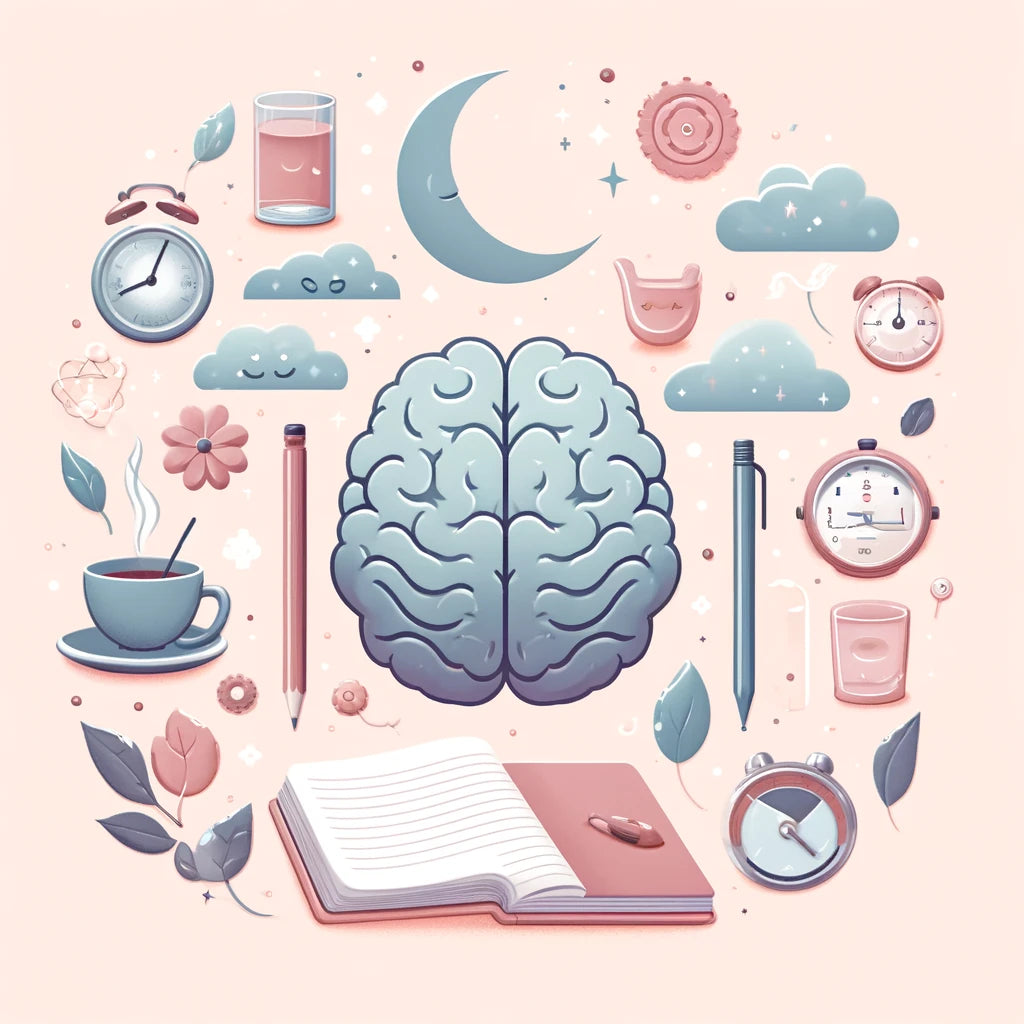If you find yourself wrestling with anxiety, insomnia, sleeplessness, a foggy short-term memory, or symptoms of depression, a "wellness diary" might be the ally you didn't know you needed. By tracking ten specific daily variables and correlating them with your levels of focus, concentration, mood, and happiness, you and your healthcare experts can uncover trends that illuminate solutions. Here's why jotting down these particulars could be a game-changer for your mental and physical health:
1. Track Sleep Patterns
Note the time you go to bed and wake up, your sleep duration, and the quality of your sleep. This can help identify patterns related to sleeplessness and suggest simple solutions for speedy improvement.
2. Hydration Habits
Recording your first glass of water and the total number you drink throughout the day, along with the volume, can highlight correlations between hydration and mood or energy levels.
3. Caffeine Consumption
Log your first caffeine intake and total consumption over the day. This can reveal its impact on your sleep quality and anxiety levels.
4. Monitor Mood Variations
By rating your happiness or mood at two different times of the day, and noting your blood pressure, you can observe how certain activities or intake affect your emotional well-being.
5. Meal Sizes and Times
Keeping tabs on the content and size of your meals and their times can help correlate your diet with mood swings, energy levels, or sleep quality.
6. Exercise Patterns
Note the duration and intensity of your physical activity. Did you have contact with nature? This information can be invaluable in understanding its effects on your sleep and mental health.
7. Alcohol Intake
Documenting alcohol consumption provides insights into its impact on your sleep, mood, and overall health.
8. Eating Habits Post-7PM
Recording what you eat after 7pm can help identify if late-night snacking affects your sleep or mental state.
9. Relaxation Techniques
Tracking activities like social contacts, meditation, reading, swimming or taking baths, including the duration, can show their benefits on your stress levels and sleep quality.
10. Medication Timing and Hydration
Detailing when you take medications and if these times align with your efforts to hydrate fully can uncover how they're affecting your wellness.
Even if you miss logging some details on certain days, the emerging trends from your wellness diary will be illuminating for you and healthcare professionals. This approach offers a solid way to connect the dots between your daily habits and their effects on anxiety, sleep, mood, and more. It's not just about tracking; it's about discovering the root causes and working towards holistic solutions. Whether you're aiming to improve your mental health, sleep better, or simply understand yourself better, keeping a wellness diary is a step towards a healthier, happier you.

Q&As for Seniors Aged 75+ on Keeping a Wellness Diary
Q1: I'm not very tech-savvy. Do I need any special apps or devices to keep a wellness diary?
A1: Absolutely not! A simple notebook and a pen are all you need to start your wellness diary. The physical act of writing can be therapeutic in itself, and there's no need to learn any new technology. Just jot down your observations about the ten daily variables each day.
Q2: I sometimes forget to write in my diary. Will this affect the usefulness of keeping a wellness diary?
A2: While consistency is helpful, it's perfectly okay if you miss a day or two. The important thing is the overall trends and patterns that emerge over time. Even sporadic entries can provide valuable insights into how your daily habits are affecting your health and well-being.
Q3: How can a wellness diary help me with my medication management?
A3: By noting the times you take your medication and any side effects or changes in how you feel, you can provide your healthcare provider with detailed feedback. This can help in adjusting dosages, changing medications, or exploring other treatments that align better with your wellness goals.
Q4: I'm worried about my privacy. What if someone else reads my wellness diary?
A4: Your wellness diary is a personal document meant for your eyes and, if you choose, your healthcare provider's. Keep it in a safe place where others won't accidentally stumble upon it. If privacy is a concern, you might consider using a coded system or initials for particularly sensitive information.
Q5: Can keeping a wellness diary really improve my mood and happiness levels?
A5: Yes, many people find that actively monitoring and writing down positive aspects of their day, along with areas of concern, helps them correlate their behaviours with their sleep hygiene, and their moods and energy levels. Over time, this practice can lead to a greatly improved management of their overall levels of happiness.

